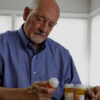Some of the Active Ingredients in Sunscreens are Absorbed Through Your Skin
Here’s a good reason to wear sun-protective clothing this summer or stick to the shade: The FDA has determined that some of the active ingredients in sunscreens are absorbed into your system through your skin, as reported in JAMA (Journal of the American Medical Association) today.
Studies dating back to 1997 have shown that sunscreen ingredients are absorbed through the skin, “but despite multiple efforts by the FDA to persuade sunscreen manufacturers to conduct key safety studies, the manufacturers have failed to produce” the information, according to an editorial in JAMA accompanying the article. So the FDA is now conducting its own studies.
Four commercially available sunscreens were used in the study — two sprays, one cream and one lotion. Each sunscreen contained a variety of the four ingredients tested: avobenzone, oxybenzone, octocrylene and ecamsule. They were applied as directed four times a day (as we are all supposed to do). Under these circumstances, the ingredients were found in all the test subjects’ plasma in concentrations higher than the FDA deems safe. Worse, this was discernible by the end of the first day and accumulated in the bloodstream as the study went on (a total of seven days).
While alarming, there’s still good reason not to panic. For one thing, the study was only conducted on 24 participants, and done so as a trial to establish if more research is needed. The study was also conducted indoors under non-typical circumstances (like spending time outdoors in the sun). All in all, researchers admit there’s still a lot more to learn.
For more about safe sunscreens, read our story, Why Is the US Behind in Sunscreen Protection?
The editors of JAMA encourage use of sunscreen while testing continues because skin cancer is a greater concern. The safest route might be to select sunscreens with zinc oxide, titanium dioxide or both. These two ingredients are designated by the FDA as GRASE, the agency’s shorthand for generally accepted as safe and effective.






